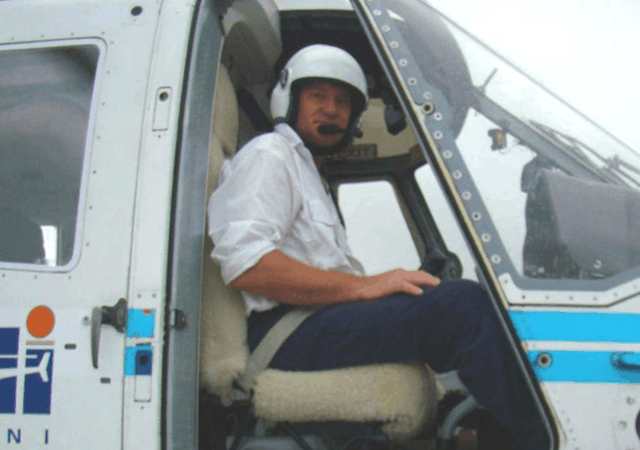Monday Accidents & Lessons Learned: Helicopter Pilot Perishes Fighting NSW Bushfire

Helicopter pilot Allan Tull was killed in New South Wales while waterbombing the Kingiman fire, burning west of Ulladulla.
What happened
On August 17, 2018, an MBB/Kawasaki BK 117, registered VH-JWB (JWB), was performing aerial work in the Ulladulla area, New South Wales (NSW). The operator had been tasked by the New South Wales (NSW) Rural Fire Service (RFS) to support firefighting activities in the Bomaderry area on August 15, then in the Ulladulla area from August 16.
On the morning of August 17, JWB departed the Nowra airport for the Milton Showgrounds, the base for helicopters operating in support of NSW RFS in the Ulladulla area. The pilot was the sole occupant and conducted a number of flights that day, refueling at 10:30 EST and again at 12:25.
In the afternoon, the pilot of JWB, in company with another BK 117, was tasked to assist ground‑based fire crews to extinguish fires near Plot Road, Milton. Both helicopters were operating with a Bambi Bucket on a longline, a specialized bucket suspended on a cable carried by a helicopter to deliver water for aerial firefighting. Pilots airborne in the same area at the time reported that the wind was approximately 23 mph from the southeast, with visibility approximately 1.86 miles due to smoke in the area.
After flying a number of circuits between a dam and the fire, the in-company pilot observed JWB departed the dam with a bucketload of water in a southeasterly direction toward the fire (Figure 1).
Figure 1: Area of fire-bombing operations

Source: Google Earth
While filling his bucket, the in-company pilot looked for JWB but could not sight the helicopter.
A witness on Plot Road observed the helicopter tracking in a northeasterly direction. A number of witnesses then observed the bucket and longline becoming tangled in trees at the edge of a clearing, followed by the helicopter crashing to the ground (Figure 2). Allan Tull, the pilot, was fatally injured and the helicopter was destroyed.
Figure 2: The accident site

Source: ATSB
Wreckage examination
On arrival at the accident site, ATSB investigators found the main body of the helicopter inverted in a clearing. The bucket was found caught in trees at the edge of the clearing. The tail rotor section was detached and located approximately 23 yards from the main wreckage. One main rotor blade had separated from the rotor head and was located approximately 10 yards from the helicopter. The other blades remained connected to the main rotor head. Aviation fuel was observed to be leaking from the helicopter; there was no post‑impact fire.
The ATSB recovered a number of components from the accident site for further examination. The helicopter was not equipped with a flight data recorder or cockpit voice recorder, nor was it required to be.
Ongoing investigation
The investigation is continuing and will include consideration of the:
- pilot’s qualifications, experience and medical history
- maintenance documentation
- recovered helicopter components
- operational documentation
- witness interviews
- electronic devices recovered from the aircraft
The Australian Transport Safety Bureau said in a statement that it will undertake a full investigation, including examining pieces of the wreckage and interviews to put together what went wrong.
After the crash, the RFS immediately grounded all aircraft fighting the Mount Kingiman bushfire.
The Sydney Helicopters website states that the company provides “many hundreds of hours” of aerial waterbombing, “Every year we supply aircraft to the NSW and ACT Fire Agencies as well as the National Aerial Firefighting Centre to assist with the combat of bushfires in NSW and interstate when required.”
Near the scene of this crash and under similar circumstances, a firefighting pilot, David Black, died five years ago when his Dromader plane crashed while fighting a blaze.
Earlier this year, helicopter pilot Phil O’Driscoll narrowly escaped death after helping save many residences from an out-of-control fire southwest of Sydney when his helicopter went down in Kosciuszko National Park. The pilot previously escaped death in 2005 in a crash in the Canadian wilderness.
The information contained in this update is released in accordance with section 25 of the Transport Safety Investigation Act 2003 and is derived from the initial investigation of the occurrence. Readers are cautioned that new evidence will become available as the investigation progresses that will enhance the ATSB’s understanding of the accident as outlined in this update. As such, no analysis or findings are included.
_____________
| Date: | 17 August 2018 | Investigation status: | Active |
| Time: | 1400 EST | Investigation phase: | Evidence collection |
| Location: | near Ulladulla, Jervis Bay SW 38 km | Investigation type: | Occurrence Investigation |
| State: | New South Wales | Occurrence type: | Collision with terrain |
| Release date: | 19 October 2018 | Occurrence class: | Operational |
| Report status: | Preliminary | Occurrence category: | Accident |
| Anticipated completion: | 3rd Quarter 2019 | Highest injury level: | Fatal |
| Aircraft manufacturer: | Kawasaki Heavy Industries |
|---|---|
| Aircraft model: | BK117 B-2 |
| Aircraft registration: | VH-JWB |
| Serial number: | 1094 |
| Operator: | Sydney Helicopters |
| Type of operation: | Aerial Work |
| Sector: | Helicopter |
| Damage to aircraft: | Destroyed |
| Departure point: | Milton Showgrounds, Ulladulla |
Circumstances can crop up anywhere at any time if proper and safe sequence and procedures are not planned and followed. We encourage you to learn and use the TapRooT® System to find and fix problems. Attend one of our courses. We offer a basic 2-Day Course and an advanced 5-Day Course. You may also contact us about having a course at your site, or call us: 865.539.2139.



